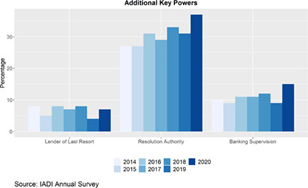Reimbursement is one of the main and important tasks, demonstrating the role of the deposit insurer in protecting the legitimate rights and interests of depositors, contributing to the safe and healthy operation of the system of credit institutions.
Reimbursement of deposit insurance - international recommendations
Principle 15 of the Core Principles for effective deposit insurer systems, recommends a number of basic standards to specify the requirements needed to make timely payments to depositors. In particular, the deposit insurer can pay the majority of insured depositors within 7 working days.
In order to pay depositors in a timely manner, the deposit insurer should have access to depositor records, including the right to require the bank to retain depositor information.
In addition, the deposit insurer should also have the authority to apply pre-payment checks (e.g. independent or joint on-site examination with a supervisory authority) on the reliability of depositor records, examine the member organization's data and information technology systems to ensure the reliability of those records.
In order to ensure effective and timely payment, the deposit insurer also needs to have sufficient resources and capabilities to handle this process, including: Financial resources and trained staff; accurate depositor information processing system; guiding documents on bank closing procedures; the simulation scenario of a bank closure situation with the participation of supervisory and resolution agencies.
In the event that the deposit insurer does not have the authority to act as a liquidator, the relevant law or regulation must oblige the liquidator to cooperate with the deposit insurer in carrying out the reimbursement process.
Some problems in practical implementation
According to the Law on Deposit Insurance, the obligation to pay insurance premiums arises from the time the SBV issues a written termination of special control, or a written termination of application, or the document does not apply measures to restore solvency that the insured institution still goes bankrupt.
Within 60 days from the time of arising the obligation to pay the insurance premium, the DIV is responsible for reimburse the insured depositors.
At the beginning of its operation, DIS paid deposit insurance to nearly 1,800 depositors at 39 people's credit funds in 11 provinces and cities. The timely and complete payout has well protected the legitimate interests of depositors; contributed to stabilizing social order and safety in localities where the people's credit fund failed. From 2015 up to now, DIV does not have to reimburse.
According to information from the DIV, by the end of 2022, this organization's professional reserve fund has reached over VND 89 trillion, and the total capital is over VND 95 trillion. This is a financial resource that helps the deposit insurer ready to reimburse depositors when necessary, as well as to participate effectively in the process of restructuring credit institutions.
However, in addition to the achieved results, there are still some difficulties in the process of implementing the payout because the provisions of the Law on Deposit Insurance are not synchronized with the legal provisions in the relevant laws, in which there is the amended Law on Credit Institutions (2017).
Specifically, the law has changed the time of termination of special control, the time when the SBV issues a document not to apply measures to recover solvency while the insured institution still falls into bankruptcy. This leads to the need to study the time when the insurance payment obligation arises in the Law on deposit insurance in order to ensure the timeliness and avoid putting pressure on the credit institution system.
Or, as the revised Law on Credit Institutions does not have specific legal provisions on the responsibilities of the DIV, the SBV branches, and the Special Control Board in coordination: Controlling the legitimacy of deposits and calculating interest on insurance payments; determining the payment amount, developing a payment plan before the end of special control or the arising obligation to pay insurance...
The process of implementing the reimbursement task in recent years has been difficult, because according to the regulations of the SBV, during the period of special control, it is still possible to carry out capital mobilization and lending activities. In some weak and non-recoverable PCFs, there are signs that the savings books are divided into many books below the coverage limit to be paid in full. However, the Law on Deposit Insurance does not stipulate that the deposit insurer refuses to pay deposit insurance in case of detecting acts of deposit insurance profiteering.
DIV also does not have the right to require the bank to keep depositor information in the required format, or to obtain deposit data in preparation for payment at the stages before the occurrence of incidents at insured institutions. DIV also does not have experience in paying depositors at banks, the simulation of payment situations has not been done regularly... These are the barriers that prevent the payment from being implemented in a timely manner as recommended by international practices.
Complete the legal corridor soon
The development strategy of deposit insurance to 2025, with orientation to 2030, issued by the Prime Minister under Decision No.1660/QD-TTg dated December 30, 2022 clearly defines the increasingly important role of the DIV in contributing to stabilizing the financial and banking system, actively participating in the process of restructuring the system of credit institutions.
In the Strategy, one of the goals set out by the DIV is to strive to shorten the actual payment time from the date of arising of the insurance payment obligation to 30 working days by 2025 and 15 days by 2030; thereby helping depositors have early access to their deposits when the insured institution is resolved.
In order to achieve the above goal, the DIV says that by 2025, this organization will complete the legal basis for deposit insurance activities, including participating in and closely coordinating with the SBV and relevant ministries and sectors in the implementation of deposit insurance activities to develop the amended Law on Deposit Insurance; complete the system of documents guiding the implementation of the Law Amending and Supplementing the Law on Credit Institutions in order to implement regulations related to the operation of the deposit insurer, including: Strengthening the financial capacity of the deposit insurer; ensuring the prevention of profiteering from deposit insurance, responsibility for coordination between the deposit insurer and related agencies; creating a legal corridor for the deposit insurer to participate in the liquidation of the insured institution’s assets in order to maximize the recovery value; regulations on the time when the insurance payment obligation arises in the direction of earlier payment in order to best protect the depositors' legitimate rights and interests...
In addition, the DIV will develop contingency plans and payment simulations for each type of insured institutions; develop a payment manual for each type of insured institution in order to standardize the payment process, diversify payment methods, and apply information technology to shorten the actual payment time.
In particular, regarding the issue of improving financial capacity, the DIV would propose the competent authorities to amend and supplement relevant legal provisions, ensuring sufficient legal basis to increase charter capital. rate to VND 10,000 billion by 2025 and to VND 15,000 billion by 2030 from self-accumulation and other legal capital sources, in order to affirm the State's commitment and improve depositors' confidence in the deposit insurance policy, ensuring resources to effectively implement deposit insurance activities.
Along with that, it is proposed to strengthen financial capacity by allowing the deposit insurer to diversify forms and investment portfolios; supplementing the form of borrowing from the SBV in case the deposit insurer's capital is not enough to pay the deposit insurance. Study, implement and supplement the investment portfolio including: Buying and selling government-guaranteed bonds; putting deposited money at a commercial bank with good operational quality; buying and selling bonds, promissory notes, bills, certificates of deposit issued by commercial banks with good operational quality.
At the same time, develop a scheme on access to support capital in case the deposit insurer's capital is temporarily insufficient to pay deposit insurance.
The National Assembly is commenting on important issues of the revised draft Law on Credit Institutions, including early intervention measures. Thus, when the National Assembly passes the Law on Credit Institutions, the role of the DIV in participating in the restructuring of credit institutions will be enhanced.
In addition, the Law on Deposit Insurance with proposed amendments and supplements, if approved by the National Assembly soon, will create a legal basis for the deposit insurer to increasingly improve its capacity and stature; innovate and enhance operational efficiency; actively participate in the process of resolving weak credit institutions. Especially, it is expected to improve the regulations on the time when the insurance payment obligation arises in the direction of earlier payment, in order to best protect the legitimate rights and interests of the depositors.
Communication Department



























